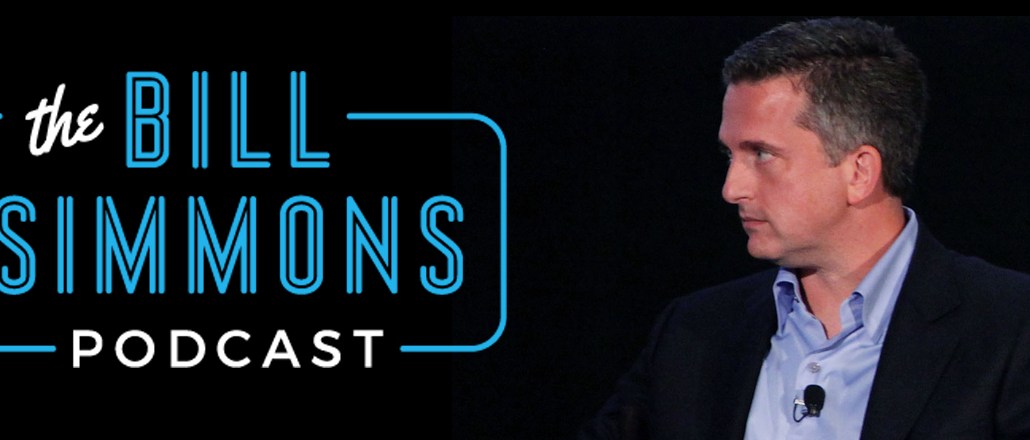Secure your place at the Digiday Media Buying Summit in Nashville, March 2-4
A solo Bill Simmons nets 4 million podcast downloads in less than a month

Bill Simmons’ podcast may no longer have the promotional muscle of ESPN behind it, but that doesn’t mean Simmons is struggling now that he’s on his own.
Simmons debuted his new podcast, “The Bill Simmons Show” on October 1 and has since been on a tear. By October 16, the show’s 10 episodes had been downloaded nearly 4 million times, according to Simmons. It’s quickly become the top podcast in the iTunes sports category and the 14th most-popular podcast overall.
“It’s not earth-shaking, but it is an impressive start ,” said Norm Pattiz, CEO of Podcast Network Podcast One. “You have to assume that a lot of his existing audience has followed him to this new platform.”
Assuming an industry average CPM of $25, Simmons’ show has likely pulled in around $350,000 since its debut, according to Pattiz. That number is almost certainly even higher considering the strength of Simmons’ brand and the scarcity of ad spots available to advertisers trying to get on his show, which pushes prices up.
Previous estimates pegged the annual revenue of Simmons’ podcast at $5 million — nearly the entire yearly revenue of the ESPN-owned Grantland, where he was formerly editor-in-chief.
And thanks to everyone out there for spreading the word on the new podcast… Closing in on 4m downloads for 10 episodes. Much appreciated.
— Bill Simmons (@BillSimmons) October 16, 2015
Simmons stands to earn more with his current deal than he did while working with ESPN, where he was paid a salary, not based on how much revenue his podcast made. Simmons, then, has even more reason to attract as many new listeners as possible. He regularly promotes the new show on Twitter, where he has 4.7 million followers, and is likely to promote it further once the HBO show he is slated to host airs next year.
“This system works because all the parties are incentivized in the right way,” said Adam Sachs, CEO of podcast network Midroll Media, which scored the ad sales rights for Simmons’ show. “It’s a lucrative situation.”
Simmons, a skillful podcast host, has proven to be equally adept at making his show’s mid-roll and post-roll ad spots genuinely enjoyable to listen to — or at the very least not annoying — which is largely what attracts advertisers to podcasts to begin with. A back-and-forth about upcoming football matchups last week slid almost seamlessly into an ad for MeUndies: “You know what, Sal? This is such a good game that I think you need you know about the feeling of great-feeling underwear that’s two times softer than cotton,” and so on.
Other advertisers have not only included direct response podcast mainstays such as Squarespace, Stamps.com and ticket site SeatGeek, but also Unversial Studios, which ran a brand awareness campaign for “Steve Jobs.”
“The host-read ads works because they are delivered in the tone and manner of the show, so the audience stays with the ad content just like they do with everything else,” said Mark Mccrery, CEO of podcast network Podtrac. “The ads are connected to the rest of the experience, so there’s no disconnect.”
It’s too early to say how big “The Bill Simmons Show” will ultimately get, but it’s certain to top the success of Simmon’s “B.S. Podcast,” which was downloaded 32 million times in 2013. What’s changed in the podcast space has a lot to do with the wildly popular true crime “Serial” podcast, which has pushed the medium further into the mainstream and increased its awareness and demand. While Simmons is best known as a sports guy among diehard fans, he also hasn’t shied away from going broader with guests such as President Barack Obama, Louis C.K. and, most recently, director Judd Apatow. That’s helped the show broaden its appeal.
“There’s been a pent up demand for his show. You could feel it when he went off the air,” said Midroll’s Sachs. “He’s not only doing something that feels very unique, but he also became a part of people’s lives.”
More in Media

Media Briefing: Turning scraped content into paid assets — Amazon and Microsoft build AI marketplaces
Amazon plans an AI content marketplace to join Microsoft’s efforts and pay publishers — but it relies on AI com stop scraping for free.

Overheard at the Digiday AI Marketing Strategies event
Marketers, brands, and tech companies chat in-person at Digiday’s AI Marketing Strategies event about internal friction, how best to use AI tools, and more.

Digiday+ Research: Dow Jones, Business Insider and other publishers on AI-driven search
This report explores how publishers are navigating search as AI reshapes how people access information and how publishers monetize content.





